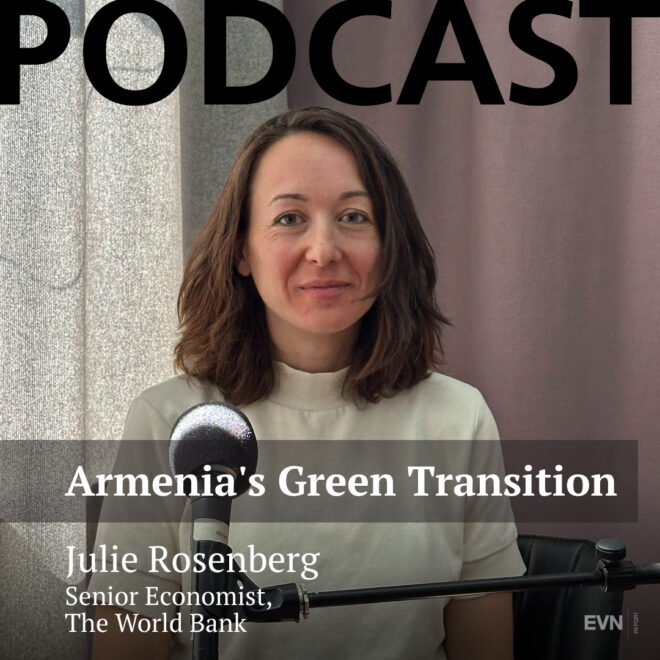EVN Talks
Stewarding a Vision
Gorr Sahakian, Vice President of the H. Hovnanian Family Foundation and Hovnanian Investment Corporation, helps manage a legacy spanning three generations. In this episode of EVN Talks, Gorr reflects on continuing the philanthropic vision of his grandfather, Hrair Hovnanian, and shares how the foundation is evolving to meet today’s challenges, balancing tradition with innovation.
The Voice of the Witness
When we record history, we typically do so chronologically, documenting facts and events, capturing footage, etc. In the process, the human voice often gets lost. It is the voice of the witness of the times that this podcast aims to capture and archive, preserving their experiences and perspectives.
New Canadian Embassy Signals Commitment to Support Armenia
More than three decades after Armenia's independence, Canada finally opened its embassy in Yerevan. Canada's first resident Ambassador Andrew Turner, a career diplomat, speaks to EVN Report's Maria Titizian about the journey to establish an embassy and Canada's strong commitment to support Armenia's democracy and security.
Healthcare and Forced Displacement
Armenia’s Minister of Health Anahit Avanesyan speaks about the challenges of addressing the healthcare needs of the forcibly displaced population of Artsakh following Azerbaijan’s large-scale attack and the ensuing mass exodus. Aside from mobilizing to provide emergency first-aid, the Ministry is making preparations for the long-term needs of the displaced.
Frontline Kitchen
Shant Petrossian, a four-time Emmy award winning producer traveled to Armenia after more than 100,000 Armenians from Artsakh were forcibly displaced from their ancestral homeland by Azerbaijan. For the past month, Shant has been working with the AGBU and the World Central Kitchen, an organization launched by chef José Andrés that provides fresh meals in response to humanitarian, climate and community crises around the world.
This Is Genocide
California Superior Court Judge Gassia Apkarian, an advisor to the Center for Truth and Justice (CFTJ), says that the forced deportation of the Armenians of Artsakh (Nagorno-Karabakh) by Azerbaijan constitutes genocide. The CFTJ, created in the aftermath of the 2020 Artsakh War, oversees the collection of firsthand testimonial evidence from survivors of war through in-depth, recorded interviews to be a living memorial to crimes against humanity, for study, education and legal action.
This Must Be Our Last Catastrophe
Former Member of the National Assembly of Turkey, Garo Paylan is in Armenia to meet with the forcibly displaced Armenians of Artsakh (Nagorno-Karabakh) who were ethnically cleansed from their ancestral homeland following a 9-month blockade and a large-scale military attack on September 19 by Azerbaijan. Paylan speaks about the need for unity as the Republic of Armenia is now facing an existential threat by both Azerbaijan and Turkey.
Humanity in Times of Darkness
Communications Manager and Spokesperson for the International Committee of the Red Cross (ICRC), Zara Amatuni, speaks to EVN Report about the work of the ICRC following the mass exodus of the indigenous Armenian population of Artsakh (Nagorno-Karabakh) after Azerbaijan's large-scale attack, the challenges facing the forcibly displaced who are now in Armenia and the fate of the missing.
Helping the Forcibly Displaced Journalists of Artsakh
Vladimir de Gmeline, a crisis director with Reporters Without Borders, is in Armenia to assess the needs of the displaced journalists from Artsakh after Azerbaijan’s large-scale attack that led to the ethnic cleansing of the entire Armenian population of Nagorno-Karabakh. Reporters Without Borders is a global organization defending the right of every human being to have access to free and reliable information.
The Many Faces of Azerbaijan’s Caviar Diplomacy
Rasmus Canbäck, a freelance journalist from Sweden, talks about his investigations into Azerbaijan's Caviar Diplomacy, being a target of an Azerbaijani smear campaign and the ongoing blockade of Artsakh (Nagorno-Karabakh) in an exclusive interview with EVN Report's Maria Titizian.












